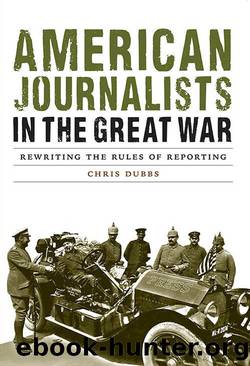American Journalists in the Great War by Chris Dubbs

Author:Chris Dubbs [Dubbs, Chris]
Language: eng
Format: epub
Tags: HIS027090 History / Military / World War I
ISBN: 978-1-4962-0017-4
Publisher: University of Nebraska Press
Published: 2016-12-20T00:00:00+00:00
Salonika, Gateway to Serbia
One year into the fighting, correspondents on the western front began to receive nagging telegrams from their editors to find some new angle on the war. Once the savage possibilities of the trench stalemate had been reported a dozen different ways, they became quite boring. Write about what was happening behind the front, some suggested. Or cover the fighting in some new location. Italy had just entered the war in May 1915 on the Allied side. Its alpine encounters with the Austrians might offer novelty. The dark hole of Serbia always held surprises. Or try the Caucasus in eastern Turkey, where no reporter had been.
Comfortably ensconced in Paris in October 1915, war reporter-artist John McCutcheon received a telegram from his editor at the Chicago Tribune that read, âGo to Saloniki [alternative spelling] stopping Athens for interview with Venizelos [Greek Prime Minister].â McCutcheonâs colleagues, United Press reporter William Shepherd and Collierâs photographer James Hare, thought it was a good idea and joined him on the journey.
On his way to Salonika, McCutcheon had only a three-hour layover in Athens to get the requested interview with the prime minister, write his dispatch, and cable it home. With the help of the American embassy, he set up a hasty meeting. It was symptomatic of Balkan politics in general and Greek politics in particular that Venizelos was no longer prime minister when McCutcheon arrived.
Venizelos lost his post by mobilizing the Greek army when Bulgaria entered the war on the side of the Central Powers, a move opposed by the Greek king. Venizelos assumed correctly that Bulgaria would attack Greekâs ally Serbia, but the king wanted Greece to remain neutral. Venizelos stated emphatically to McCutcheon, âIf I return to power, I shall make war against Bulgaria.â
McCutcheon hurried to the cable office to fire off his short summary of the interview. There was no censorship in neutral Greece to slow things down. Then he took a blazing taxi ride to the port, where his ship had already raised anchor. He had to climb the boarding ladder of the moving ship from a rowboat to get onboard. Another day in the life of a war correspondent.
âIf ever a stage was set for trouble, it is here,â McCutcheon wrote in his first cable from Salonika. By early November 1915, Salonika had become an Allied base and a key news center. Typically a bustling, crowded port city of 120,000 souls, Salonika now had 100,000 Allied troops quartered in the city, along with 100,000 mobilized Greek troops and their families.
The three correspondents took over the only available accommodations at the Olympus Palace Hotel, a vast open space that had previously been the hotel dining room. Its large windows looked directly onto the harbor and the stone landing steps of the main pier. It provided the perfect viewing post for the drama of Salonikaâs waterfront. Passenger liners, fishing boats, cruisers, submarines, freighters, hospital ships, and mammoth battleships crowded the water. Transports unloaded troops, artillery, ammunition, and supplies. Throughout the
Download
This site does not store any files on its server. We only index and link to content provided by other sites. Please contact the content providers to delete copyright contents if any and email us, we'll remove relevant links or contents immediately.
Asking the Right Questions: A Guide to Critical Thinking by M. Neil Browne & Stuart M. Keeley(5747)
Autoboyography by Christina Lauren(5221)
Eat That Frog! by Brian Tracy(4508)
Dialogue by Robert McKee(4380)
Sticky Fingers by Joe Hagan(4181)
Journeys Out of the Body by Robert Monroe(3608)
Annapurna by Maurice Herzog(3460)
Full Circle by Michael Palin(3436)
Schaum's Quick Guide to Writing Great Short Stories by Margaret Lucke(3368)
Elements of Style 2017 by Richard De A'Morelli(3336)
The Art of Dramatic Writing: Its Basis in the Creative Interpretation of Human Motives by Egri Lajos(3057)
Why I Write by George Orwell(2944)
Atlas Obscura by Joshua Foer(2943)
The Diviners by Libba Bray(2924)
The Fight by Norman Mailer(2921)
In Patagonia by Bruce Chatwin(2915)
The Mental Game of Writing: How to Overcome Obstacles, Stay Creative and Productive, and Free Your Mind for Success by James Scott Bell(2893)
Venice by Jan Morris(2563)
The Elements of Style by William Strunk and E. B. White(2463)
